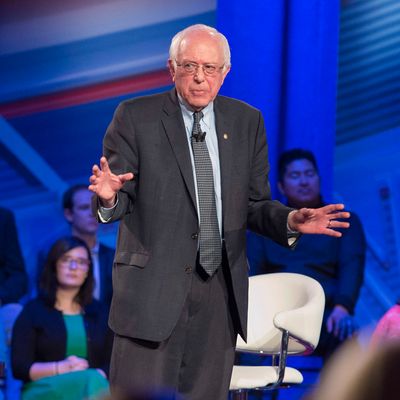
With just a week to go before 2016 voting finally starts, on Monday night, Iowans got to compare the three Democratic candidates one last time. CNN only announced that it would televise the town hall at Drake University in Des Moines a week ago, and the value of squeezing in one more forum remains debatable. There were no moments that will drastically change the political landscape heading into Iowa; Bernie Sanders mainly discussed income inequality, Hillary Clinton emphasized her experience, and Martin O’Malley turned in a solid performance that will be completely overlooked. On the other hand, anyone who missed the last four Democratic debates — perhaps because they were buried on weekend nights — got to hear a recap of the candidates’ pitches and some subtle shots at their opponents.
The candidates were never onstage together, but Sanders and Clinton were focused on highlighting their differences. When moderator Chris Cuomo asked Sanders if he’s “up to the whole job” of being president, the senator said he has the requisite judgement, as evidenced by his vote against the Iraq War (which Clinton supported).
He insinuated that Clinton’s strong gun-control stance is merely political calculation. “Some of you might recall that back in 2007, when she was running against Barack Obama, she also focused on that issue,” he said. “But she thought that Obama was too strong on gun issues. You may remember him referring to her as ‘Annie Oakley,’ alright?”
Sanders also doubled down on his previous Clinton–Dick Cheney comparison. “Experience is important, but judgment is also important,” he said. “My own point was in talking [about] Dick Cheney, he had a lot of experience too. His policies with regard to foreign affairs was an absolute disaster. So, experience is important, but it is not the only thing.”
When CNN prompted Sanders to attack, making him watch a Clinton ad, he asked why it took his rival so long to come around on opposing the Keystone Pipeline and the Trans-Pacific Partnership.
As for Clinton, she repeatedly tried to paint herself as the more well-rounded candidate. Questioned about her commitment to the battle against income inequality, she said, “I think it’s fair to say that I have a 40-year record of going after inequality — and not only economic inequality: racial inequality, sexist inequality, homophobic inequality.”
When challenged on her Iraq vote, she reiterated that it was a “mistake,” but added, “when that hard primary campaign was over and I went to work for President Obama and he ended up asking me to be secretary of State, it was because he trusted my judgment.”
Like Sanders, Clinton was forced to watch one of her rival’s ads. She responded with a hearty chuckle and a quote from Cuomo’s father, the late New York governor, suggesting the senator is all heartwarming Simon and Garfunkel videos, no action. “I think that’s great. I think that’s fabulous. I loved it,” she said. “You know, look, you campaign in poetry, you govern in prose. And we need a lot more poetry in this campaign and in our country. So, I applaud that. I love the feeling. I love the energy.”
The two front-runners faced some other difficult exchanges. For instance, the first two questions posed to Clinton were basically, “Why is Bernie doing so well?” and a young woman challenged Sanders about describing Planned Parenthood as the “establishment.” (Yes, there was actually a question on reproductive rights!) Yet, Sanders was given ample time to describe his vision for going after Wall Street, and Cuomo kicked things off by noting that Clinton just picked up several newspaper endorsements and President Obama called her “wicked smart.”
As usual, Martin O’Malley’s biggest challenge wasn’t Clinton or Sanders, but the media’s lack of interest in him. His Q&A was rough right from the start. Cuomo pointed out that the Des Moines Register endorsed Clinton and called him, “better suited as one of her cabinet secretaries than as president.” Then when they turned to the audience, O’Malley was asked how he can claim to address racial inequality when his policies as mayor of Baltimore and governor of Maryland disproportionately affected the black community.
Later, O’Malley got the worst of many awkward questions when Cuomo asked whether he’d like his caucus supporters to back Clinton or Sanders when he fails to reach the 15 percent threshold.
O’Malley came off much better in the town-hall format than he has in the debates, and he even conjured up a decent response to Cuomo predicting his political demise. “My message to the O’Malley supporters across this state is this: Hold strong at your caucus,” he said. “Hold strong at your caucus because America’s looking for a new leader. America’s scanning the horizon. We cannot be this fed up with our gridlocked, dysfunctional national politics and think that a resort to old ideologies or old names is going to move us forward. So I tell my people hold strong.”
Is O’Malley’s performance on Monday night going to increase his chances in Iowa? In all honesty, no. But at least viewers got a chance to hear him discuss some of his policy proposals, rather than just his thoughts on the debate moderators not allowing him to speak.






























